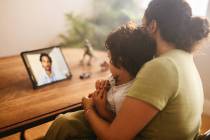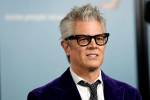Fatherhood is its own reward
These guys who fear becoming fathers don’t understand that fathering is not something perfect men do, but something that perfects the man. The end product of child raising is not the child but the parent.
— “Man Enough: Fathers, sons, and the search for masculinity,” by Frank Pittman (1935-2012)
I notice the themes walking into my office. In the last few years, it seems more and more a man will walk into therapy like the man today, saying simply, “I’m here to learn to be a better father.”
And I sit in my chair and struggle to maintain a detached therapeutic persona. Because already I’m smiling. Already I want to rain confetti down on this man. To hand him flowers. I want to unleash a whoop of joy and victory. What more beautiful gift to give your children than to desire to learn and grow as a father! A gift with exponential benefits to the whole world, actually.
And, like always, my mind floats back in time …
June 16, 1991. 12:47 a.m. Scrawny and tall. Absurdly long, jet black hair. All arms and legs. Like taking a ventriloquist dummy out of a trunk. Jonathan Paul comes squalling into the world.
In the wee hours of that joyful morning, he and I each embraced, for the first time, a new identity: I as a father, he as a son.
When I returned to work at the Suicide Prevention Center in Tempe, Ariz., my colleagues had mounted a banner of congratulations on the ceiling. I was a first-time father, dizzy with fatigue, fear, joy and wonder. It was good to feel the wider community of humanity holding me tight in encouragement and celebration.
Michel stood out. Born in France, he handed me a cigar and said, “Whenever a man becomes a father, he has another chance to become king.”
His words nailed my feet to the floor.
Now, unless you happen to be familiar with the works of Swiss psychiatrist Carl Jung, you might wonder what Michel meant. But I knew. Michel was referring not to dominating rule or being “in charge.” He was not inviting me to ambition or glory. Rather, he was pointing to king as archetype. As a blueprint for the growth and development of a healthy and powerful masculine identity.
The Leader. The Teacher. The Beneficent Authority, meaning, a wielding of power that perpetually desires to empower and liberate those over whom the king rules.
The Protector. The Provider. The Sacrificial Heart. The king whose authority strives to bring a delicate, artful and beautiful balance of mercy and judgment. Expectations and patience. Compassion and accountability. Experience forged into wisdom and humility.
The king has a head and a heart, each good friends and regular guests of the other.
The king can think and feel. His touch includes gentle caresses and firm restraint. The king can laugh, cry, act, wait and, when necessary, thunder. His no means no. His yes means yes. He is not entitled and aggrandized by his authority; rather, humbled, sobered, ever-cognizant of the weight and responsibility of his power.
The king’s power can lift up, can heal, inspire, transform and reconcile. That same power can abandon, injure, terrify and cripple.
The king teaches respect — for self, for the mother, for women, for authority, for the dignity of every human being.
The king’s love is sentimental and fierce. His anger does not belittle. He uses his physical power not to hit, but to restrain and contain. To hold. To soothe.
The king teaches empathy primarily because he can practice empathy. The king knows it is the devil’s lie to say that vulnerability is weakness. Rather, an open heart is the most powerful force in the universe. This is courage. (Look it up. The word courage, in its literal Latin origins means “open hearted.”)
And, perhaps the most important part of this archetype, the king never demands any respect or tribute from his subjects that he is not willing and desirous to return in like kind.
I knew what Michel meant. It was a tall order. But I was inspired to try. Not to mention to redeem. I felt as if I had won the cosmic lottery. Now I would have the chance to try to be the father I always wanted to have.
That’s the paradox, see. The practice of selfless love is no mere benefit to those a father loves. The selfless love of The Good Father benefits the father, too. It rescues and redeems his own soul.
Steven Kalas is a behavioral health consultant and counselor at Las Vegas Psychiatry and the author of “Human Matters: Wise and Witty Counsel on Relationships, Parenting, Grief and Doing the Right Thing” (Stephens Press). His columns appear on Mondays. Contact him at 702-227-4165 or skalas@reviewjournal.com.























